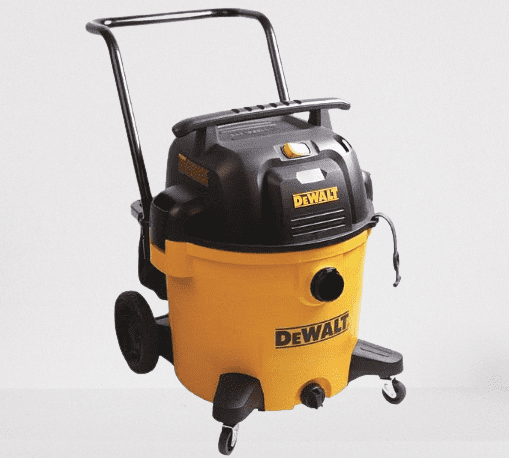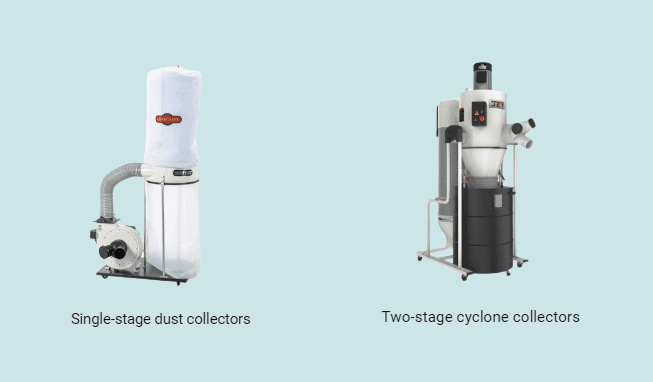YOUR NO 1 WOODWORKING POWER TOOLS RESOURCE WEBSITE
Shop Vac vs Dust Collector: Choosing The Best For Your Workshop

Disclosure: If you click on some of the links, we may earn a small referral fee. Please know that we only recommend products that we use and believe will add value to our readers.
In this article, we’ll compare two popular dust collection options for woodworkers: The shop vac and dust collectors. We’ll explore their benefits, and drawbacks, allowing you to make an informed decision for your woodworking haven.
Related: See our comprehensive guide to dust control in woodworking including 9 best practices
Shop Vac vs Dust Collector (Summary Table)
|
Criteria |
Shop Vac | Dust Collector | |
|
Filtration Efficiency |
Struggles with capturing tiny particles | Excellent filtration capabilities | |
|
Noise |
Louder | Quieter | |
|
Portability |
Lightweight and compact | Larger and less portable | |
|
Versatility |
Can handle other cleaning tasks | Specifically designed for dust collection | |
|
Cost |
Generally more affordable | Typically more expensive |
Brief Overview of Shop Vacs

Shop vacs, also known as wet/dry vacuums, are heavy-duty cleaning tools designed for the rigors of use in workshops and construction sites. These vacuums have high suction power, which is ideal for quickly cleaning up concentrated messes. With their narrow hoses and focused suction path, shop vacs can easily pick up debris from the floor or directly from power tools with compatible ports.
Most shop vacs use a one-stage system, where both large and small particles are collected in the same canister. This can sometimes lead to the motor becoming bogged down by larger particles, affecting its longevity. Despite this drawback, shop vacs are versatile and can handle a wide range of cleaning tasks beyond dust collection.
Our Recommended Shop Vac: DeWALT DXV14P Wet/Dry Vacuum
If you’re in need of a powerful shop vac that excels at dust extraction, the DeWALT DXV14P is an excellent choice. With a large 14-gallon capacity canister and wet/dry operation, it is perfect for handling any messes in your workshop. Despite not being a dedicated dust collector, it offers impressive suction power and a washable filter cartridge for efficient dust collection. Its portability, great build quality, and affordability make it a top pick for occasional to moderate use.
Get the DeWALT DXV14P Wet/Dry Vacuum Available at:
Brief Overview of Dust Collectors

A dust collector is a vacuum device specifically designed for removing sawdust from woodworking workshops. Unlike shop vacs, dust collectors have a larger hose and a more powerful motor. They are typically divided into 2 categories; single-stage and two-stage or cyclone dust collectors.
A single-stage dust collector connects directly to a stationary power tool, depositing the wood dust into a bag. However, by adding a cyclone dust separator, a one-stage system can be transformed into a two-stage system, with the cyclone collecting most of the sawdust into a separate bucket before the smaller particles are trapped by the filter.
Dust collectors are ideal for larger power tools like table saws, miter saws, and wood planers. They offer benefits such as improved safety by controlling airborne dust, increased efficiency by reducing cleanup frequency, and the convenience of recycling sawdust for other projects.
Our Top Dust Collector Recommendations
When it comes to dust collectors here are our recommendations:
1. Shop Fox W1666 Dust Collector (Single-stage)
This Shop Fox model is a great pick for those who prefer a single-stage dust collector. It has a robust motor and provides an impressive air suction capacity, making it proficient at collecting dust from your woodworking machinery. The setup might not be as advanced as a two-stage system, but for small to mid-sized workshops, it performs exceptionally well.
Get the Shop Fox W1666 Dust Collector Available at:
For more options see our article on the Best Portable Dust Collectors for Woodworking
2. JET 717530K Dust Collector (Cyclone)
The JET Cyclone Dust Collector is the model to go for if you prefer a two-stage system. With an impressive max flow of 1,240 CFM, it can handle heavy-duty dust collection tasks. Notably, its cyclone design separates larger and smaller dust particles, which prevents the filter from clogging and maintains excellent airflow. Moreover, the 3HP motor ensures longevity and optimal performance.
Get the JET Cyclone 717530K Dust Collector Available at:
For more options see our article on the Best Cyclone Dust Collectors for Small Shops
Shop Vac or Dust Collectors (Side-by-Side Comparison)

Now that we have a brief overview of shop vacs and dust collectors, let’s compare them side by side.
Dust Filtration Efficiency
When it comes to dust collection, the efficiency of filtration is crucial. Dust collectors, with their two-stage system, are known for their excellent filtration capabilities. They can separate larger particles from smaller ones, ensuring that the motor remains unclogged and operates smoothly. On the other hand, shop vacs, with their one-stage system, may struggle to filter out the tiniest dust particles effectively.
Noise
Shop vacs, with their high suction power, can produce significant noise, which may be a concern if you value a quieter workspace. Dust collectors, with their larger hoses and lower suction, tend to generate less noise during operation.
Portability
Shop vacs are designed with portability in mind. They are lightweight and compact, making it easy to move them around your workshop or even take them to job sites if needed. Dust collectors, on the other hand, are typically larger and less portable. They are meant to be stationary and connect directly to your power tools.
Versatility
Shop vacs are versatile tools that can handle a wide range of cleaning tasks beyond dust collection. They can be used for general cleaning, wet messes, and picking up debris. Dust collectors, on the other hand, are specifically designed for collecting sawdust from woodworking tools. They excel at controlling airborne dust and providing a cleaner workspace for woodworking projects.
Cost
In terms of cost, shop vacs are generally more affordable compared to dust collectors. Shop vacs are widely available and come in various sizes and models to suit different budgets. Dust collectors, with their specialized design and larger capacity, are typically more expensive.
Frequently Asked Questions (FAQs)
What is the best way to control wood dust in my workshop?
Dust collectors are generally better suited for controlling wood dust in a workshop. They have superior filtration capabilities and are specifically designed for woodworking applications.
What are dust extractors?
Dust extractors are indeed a blend between shop vacs and dust collectors. They combine the portability of a shop vac with the improved filtration capabilities of a dust collector. Dust extractors are specifically designed for collecting sawdust and debris and filtering the air in your workshop. They are ideal for smaller handheld power tools and come equipped with HEPA-grade filters, which can capture even the finest dust particles, as small as 0.3 microns.
We suggest the Festool 574837 Ct Midi I Hepa Bluetooth Dust Extractor. With its HEPA filter, it ensures excellent air filtration and cleaner air quality in your shop.
Can a shop vac be used as a dust collector?
While a shop vac can be used for dust collection, it may not be as efficient as a dedicated dust collector. The primary difference lies in the filtration system. Shop vacs usually have a one-stage filtration system, which means that larger and finer particles are collected together. This can result in the motor getting clogged more quickly and affecting its performance. In contrast, dust collectors with a two-stage system separate larger particles before reaching the filter, allowing for better airflow and reduced maintenance.
What are some safety precautions when using dust collection systems?
Here are some precautions to keep in mind:
- Ensure proper grounding of your dust collection equipment to prevent static electricity buildup.
- Regularly clean and maintain your dust collector or shop vac to keep it in optimal working condition.
- Wear appropriate personal protective equipment such as safety goggles, dust masks, and hearing protection to reduce exposure to airborne dust and noise.
- Follow manufacturer instructions and guidelines for installation, operation, and maintenance of dust collection systems.
- Ensure proper disposal of collected dust, following local regulations and guidelines.
Also, see our safety guidelines for using power tools in the workshop
Final Words
If you prioritize portability and versatility for various cleaning tasks and occasional dust collection, a shop vac might be the right option. On the other hand, if you have larger power tools and generate a significant amount of dust, a dust collector would be more suitable.
Pinterest Image

Enjoy our articles? You can follow us on Pinterest for more woodworking power tools tips and tricks.
Save on selected power tools from top brands - Shop Now on Zoro.




Thank you for the detailed comparison between shop vacs and dust collectors! For a small woodworking shop that handles various types of wood, which system would you recommend to effectively manage both larger wood chips and finer dust particles